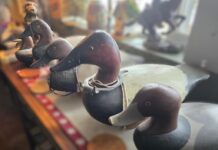“Toil and triumph can be so closely bound that the memory of accomplishment becomes one and the same.”
— Anonymous
The span of a lifetime is filled with great hills and valleys, and I have come to believe that those who have a connection to the land become molded strong to stand tall through it all. One often-repeated instruction from my dad was “make sure the barn doors are closed” and would many times ask at the supper table if we had closed up all the barns.
When we would go for a ride in the evening, he would circle back around the barns to be sure all was well. I came to realize many things my father did came from his pride in ownership, but also great concern for making it as a family farmer.
Big barns
He held respect for the farmers before him who had built those big barns. Protecting all that he had worked hard to put up in the barns was a responsibility that he took seriously. I once met the man dad hired to work on major barn repairs, as he discussed plans to strengthen the foundation of the Springer barn.
I enjoyed listening to the two men talk about the art of a bank barn. Dad later told me he had great respect for this older gentleman, saying little repairs saved a barn from total disrepair.
He remarked that farming involves a great deal that does not pay the bills, and worry and watching and repairing is a big part of that. I remember daily trips to watch the progress of a massive repair project on the big red barn built by dad’s great-grandfather.
Samuel Young, who had built the largest barn in the area in 1883, was proud of his impressive bank barn. His oldest son became my father’s grandpa and his childhood mentor. I have to wonder if it was his grandpa Young who instructed that little boy to be sure to close the barn doors every night.
Not really work
Dad often said farming really did not feel like work to him. It was a part of who he was and who he wanted to be. He was able to grow his farms in those early years with a keen business head while teaching us all how to work hard right alongside him.
He half-jokingly said the best help are “the ones you grow yourself” because he knew he could count on us to get the job done, while taking enough pride in the place to do the obvious jobs without being told.
Not a hunter himself, Dad had a healthy respect for wildlife. He was generous in granting permission to hunt, knowing population control was also important. He taught our dog to go after the groundhogs, but to leave the rabbits alone.
Top dog
In my high school years, my older sisters grown and gone, my brother 5 years behind me, I was dad’s go-to worker at the end of each day. “Did you dry-treat the cows in the Doc Smith pen?” Yes. “Did you remember to close the fence to the big pasture?” Yes. “Did all the calves eat?” Yes. “Did you close the barn doors?”
This question, one dreary night, prompted me to say, “Dad, you know by now that you don’t have to quiz me on that one.” He reached for his pipe, buying a bit of time, before responding. Finally he said, “I know I can count on you.” And after that night, he didn’t ask. It felt like a promotion to top dog.
Farm first
There were things in school I was not able to participate in, because the dairy farm really did come first, but dad had a way of making it all feel worthwhile. I also knew there were things dad would have loved to add to the farm but carefully selected priorities based on finance.
When we bought this farm, I often wished dad could have seen the majestic barn that sold us on the property. On the terrible winter morning that flames consumed it, I was glad he didn’t have to share our heartache.
Family farming, with its challenges and bounties, cycles through the seasons, each one demanding a whole lot of sweat equity. Along the way, it demands toil and worry that is not seen. Triumph, too, does not always show up on a ledger. It is much larger than that, and is carried forward by the generations. For no matter the ultimate success or the heartache, no one takes it with them through death’s door.













